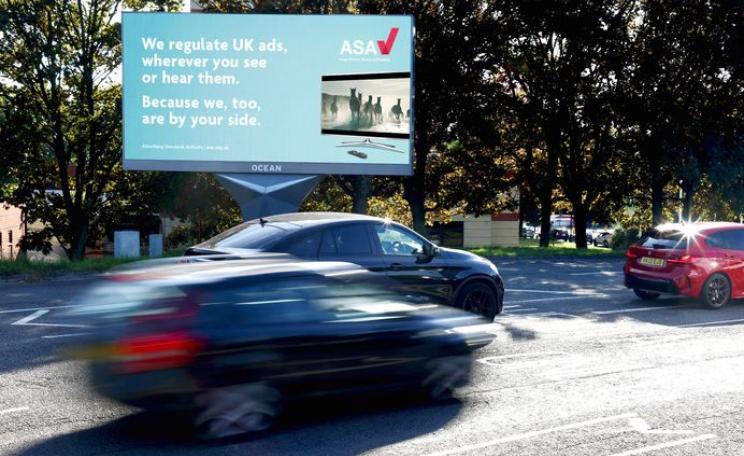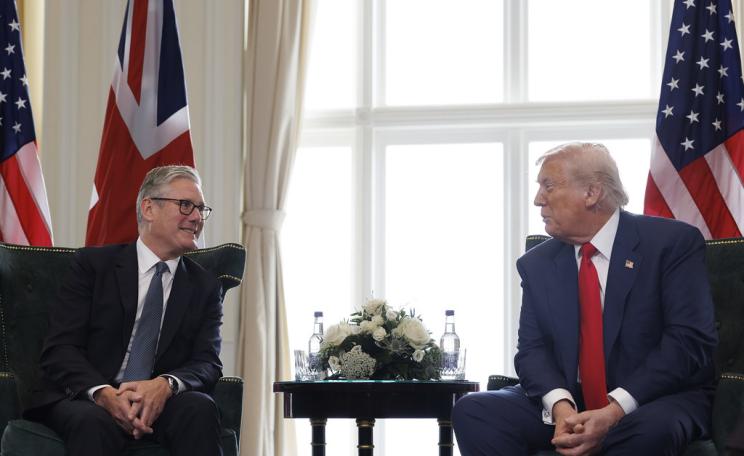You can position yourself as a climate saviour whilst happily being chief propagandist to some of the planet’s biggest polluters.
When the world’s biggest ad firm, WPP, says it believes that "the climate crisis needs to be addressed with increasing urgency" and says it will take a leadership stance, you don’t expect that "lead" to be as the agency with the biggest number of contracts to promote heavily polluting, fossil fuel companies.
Yet that is how things are in the upside down, alternative reality of the advertising world. You can position yourself as a climate saviour whilst happily being chief propagandist to some of the planet’s biggest polluters.
But these contradictions weigh too heavily on even the masters of illusion to stand for long. WPP has now been reported to the international watchdog on corporate responsibility at the OECD in a ‘first of its kind’ type complaint detailing how the company has broken multiple rules on climate change, environment and human rights.
Breach
WPP had 79 fossil fuel contracts in the last financial year, 2023-2024 - more than any other advertising company in the world.
The London headquartered firm works for several of the world’s biggest polluters, including Shell, BP, Saudi Aramco, ExxonMobil and Chevron, as well as heavily polluting carmakers, airlines, plastics giants and fossil fuel financiers.
The complaint details how WPP has failed to prevent serious adverse impacts on human rights, climate and the environment through its promotion of polluting clients. It has been drafted by barristers at Doughty Street Chambers in London, and filed by the New Weather Institute think tank and campaign group Adfree Cities.
It marks a “step-change” in global efforts to address the environmental and social harm caused by advertising.
The first-of-its-kind complaint alleges that WPP’s work for clients including Shell, BP, Toyota, HSBC, JPMorgan Chase and CocaCola “directly increases demand for carbon-intensive products and undermines global efforts to reduce greenhouse gas emissions”, and is in breach of the OECD’s international guidelines for corporate responsibility.
Pledges
According to the legal documents that make up the complaint, WPP, whose subsidiary agencies include Ogilvy and VML, has failed to meet the guidelines’ requirements for corporations to act sustainably and responsibly, due to “the climate, environmental and human rights impacts facilitated through its advertising services”.
The central role of advertising in “driving demand for high-carbon products and delaying the energy transition,” is highlighted, which WPP has failed to “sufficiently identify, prevent, or mitigate”. Climate breakdown threatens a range of human rights, including to health, life, water and sanitation and food.
You can position yourself as a climate saviour whilst happily being chief propagandist to some of the planet’s biggest polluters.
Research in 2022 found that the UK advertising industry added 32 per cent to the annual carbon footprint of every UK citizen through the emissions linked to the extra consumption of goods and services driven by advertising, also called ‘advertised emissions’.
As advertising firms have not yet faced litigation on climate grounds, unlike many of their carbon-intensive clients, this challenge against WPP marks a significant increase in legal risk for the sector.
Dr Veronica Wignall, co-director at Adfree Cities, one of the two groups reporting the complaint, said: “It’s been said that advertisers are the architects of desire. I look around and see ads everywhere for SUVs, plastic polluter giants and long distance flights, in between newsreels of climate disasters and nature loss.
"It is now both morally unforgivable and increasingly a legal risk to do promotional work for toxic brands like Shell and Coke. WPP is currently working against the greener, fairer future the world urgently needs. We’re calling on WPP to live up to its climate pledges and stop promoting polluters.”
Greenwashing
Margherita Cornaglia and Harj Narulla, barristers at Doughty Street Chambers, co-wrote the complaint. Narulla said: “This complaint to the OECD’s UK National Contact Point marks a step-change in legal risk for advertisers working to facilitate fossil fuel companies and other major polluters.
"Our complaint clearly shows that by representing high emitting clients, WPP is in breach of its human rights, climate and environmental duties under the OECD Guidelines. WPP must disengage from these clients and start meeting its due diligence and disclosure obligations.”
Investors at WPP have themselves warned that the legal and reputational risks for advertising companies that continue with fossil fuel client work are becoming unsustainable.
Andreas von Angerer, head of impact at sustainable investment firm Inyova, which leads a group of investors engaging WPP, said: “Since 2023, we have been urging PR and advertising firms to address the legal and reputational risks of working for high-carbon clients. The OECD complaint against WPP is a stark example of how quickly these risks are materialising.”
According to WPP’s own Annual Report 2023, the company’s policy “is not to take on any client work, including lobbying, designed to frustrate the objectives of the Paris Agreement”.
However, this is starkly contradicted by WPP’s work to promote fossil fuel companies and other polluters. Work for such clients opens WPP to accusations of greenwashing.
Action
A ‘cleaner energy’ advert for Shell made by WPP agency Wunderman Thompson (now VML) was banned by the UK Advertising Standards Authority (ASA) in 2023 for misleading consumers by failing to mention the oil giant's large scale fossil fuel operations and emissions.
A second ‘Powering Progress’ Shell ad by VML, which portrays Shell as investing in the energy transition, is currently under investigation by the ASA.
WPP’s agency Ogilvy has worked with BP for more than two decades, helping to curate an image of environmental responsibility through a full rebrand, reputation management, advertising campaigns and sponsorships.
In 2020, a leaked briefing from BP to WPP agencies stated BP’s strategy to “invest in more oil and gas” before asking the agencies to position the oil major as a leader in the clean energy transition. In 2024, BP abandoned its previously declared climate targets and announced that it was expanding its oil and gas output.
A related concern included in the complaint is how WPP agency, Ogilvy Government Relations (OGR), has “repeatedly engaged in work designed to frustrate the goals of the Paris Agreement” through its work for the American Petroleum Institute (API). API is a regular opponent of climate action - including lobbying against methane regulation and a windfall tax on oil companies.
Illusioneering
WPP, it appears, wants to have its green reputation and be able to eat it. But you cannot make climate pledges and still promote the world’s most polluting companies.
Advertisers may be skilled at creating alternative realities, but in believing it can do both WPP appears to have has fallen for its own stock-in trade illusioneering, breaking its own rules and multinational guidelines.
WPP’s oil and gas company clients - from BP to Shell and most recently Equinor (who are embroiled in attempts to develop the Rosebank oil field) have publicly ripped up green promises. In this light, the agencies' assertion that they deal with such clients to help them do better looks either disingenuous or self-deluding.
WPP has acknowledged that its work has an impact on the environment through influencing people’s way of living. “We recognise that our greatest contribution to the planet is through our work, which can shift attitudes and change behaviours to build a sustainable future and a more inclusive society,” it states.
Goals
Yet WPP has a lengthy list of aviation clients, which includes British Airways and United Airlines, and its work for heavily polluting carmakers including an 80-year relationship with Ford.
Advertising has also helped to increase demand for larger, heavier and more polluting Sports Utility Vehicles (SUVs), which were responsible for over 20 per cent of the growth in global energy-related CO2 emissions in 2023. In 2023, an advert for a Toyota SUV, made by WPP agency The&Partnership, was banned for promoting environmentally irresponsible driving.
Similarly, WPP successfully pitched for the $4 billion CocaCola marketing account in 2021 -despite experts warning that plastics pose a ‘critical human health crisis.
CocaCola is the world’s worst plastics polluter, responsible for 11 per cent of branded plastic pollution worldwide. In 2023, James Quincey, the chief executive of Coke in 2023 dubbed marketing a “motor for growth”. The following year the company weakened its recycling and reuse goals, as well as watering down its carbon emissions targets.
Polluter
The guidelines that the complaint says WPP have broken are government-backed voluntary standards for OECD countries to promote responsible business conduct by multinational companies.
They are considered the most comprehensive set of obligations on business conduct available today, which makes WPP’s alleged breaches a potentially significant moment in corporate governance.
This complaint is designed to compel WPP and its many subsidiaries simply to comply with international rules it is signed up to, and the promises and claims it has made.
In practice, that means they must own-up and disclose and deal with the extra climate pollution that results from promoting some of the biggest polluters on the planet – their so-called ‘advertised emissions’.
It means they must check who and what they are treading on, and start conducting proper due diligence to spot, prevent and reduce the damage from its business relationships.
Irresponsible
Fundamentally, they must drop clients who are not aligned with climate goals, like the major oil and gas companies, and who are going backwards on climate action. WPP must also stop making false and misleading claims about its own climate behaviour.
All this would just bring WPP into line with what it already claims to live up to. If WPP does not take these steps, the complaint asks that the company should be officially found to be in breach of the OECD Guidelines.
Every wildfire and extreme weather event is a reminder that we are in an age of climate consequences.
Advertisers are working on briefs that deliberately target young people, politicians and consumers with misleading ads and pro-polluter messages. For those irresponsible enough to actively promote pollution, the consequences they face may well include ending up in court.
Right of Reply
A WPP spokesperson said: “Contrary to the claims being made, we adhere to the highest regulatory standards in our work for clients. If the UK and other countries want stronger economic growth and the benefits this brings to society, companies need to be able to market their goods and services, within a clear framework of rules and codes of practice. Along with our clients and the rest of the advertising industry, we take great care to comply with all marketing regulation, and we are proud to act as a catalyst for growth across every sector of the economy.”
A spokesperson for the Advertising Association said: “It is important to remember that advertising plays a fundamental role in supporting businesses to generate jobs, compete, innovate, and invest in products and services that will serve the economy, now and in the future. All advertising in the UK must comply with strict content rules enforced by the ASA and the regulations on environmental claims must also comply with the CMA’s green claims code. On very rare occasions advertisers fall foul of these rules and the ads are amended or withdrawn. Leading advertising businesses are working hard to decarbonise their supply chains and WPP has set an ambitious net zero target of 2030. Advertisers will have varying commitments and latest data from SBTi shows rapid increases from businesses around the world setting emissions targets in line with the Paris goals.”
A spokesperson for the IPA said: “This challenge against WPP seems to us to not only be without foundation but also misguided. The regulations governing what can be said in this area are understandably strict, unintentional infractions can happen, notwithstanding this, virtually all advertising undertaken by WPP on behalf of the clients cited in the complaint, to our knowledge, complies with the Advertising Standards Authority and the other regulations pertaining to environmental claims. Furthermore, we would draw attention to the wider actions taken by WPP, as one of the World’s leading Communications networks, to be amongst the leaders of their peer group in working towards a net zero target for their own business. It is well established how hard many of the world’s biggest companies are working to produce more sustainable products and services. Their ability to continue to advertise their brands plays a vital role in encouraging consumers to change their purchasing habits towards greener choices.”
A spokesperson for ISBA said: “If we want an economy and environment fit for the 21st century, then sectors from energy to FMCG need to be able to invest in change. In part, that investment comes from their continued operation, while they research, develop and switch to the products and services which will underpin a more sustainable future.”
This Author
Andrew Simms is co-director of the New Weather Institute, co-founder of the Badvertising campaign, coordinator of the Rapid Transition Alliance, and co-author of the original Green New Deal. Follow on BlueSky @andrewsimms.bsky.social. Find out more about the case against WPP, here.







